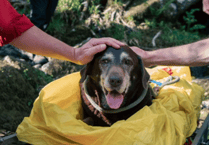A LOCALLY rare beetle, and a member of the clown beetle family, has been found on in-bye land at Bittaford, adjacent to Harford and Ugborough Common.
Discovered by entomologist Clive Turner this April, Atholus bimaculatus was last recorded near Plymouth in the late 1930s. It was a surprise inclusion within a targeted dung beetle survey. At 3.5-5mm long, clown beetles get their name from their brightly coloured forewings.
This species of clown beetle feeds and nests in livestock which puts nutrients back into the ecosystem, improves soil structure and carbon capture. The beetle itself is also an important food source for other species, from birds to bats. Clown beetles rely on a constant supply of good dung that is pesticide and insecticide free.
This June and again in September, two further dung beetle surveys will be carried out to gather more data on dung beetle diversity and abundance. The work is being coordinated by the Dartmoor Hill Farm Project under the Healthy Livestock strand of the Foundation for Common Land’s Our Upland Commons Programme supported by National Lottery Heritage Fund.
Helping out with the project are six Harford and Ugborough Common graziers. They are involved in the field surveys and are learning more about dung beetle ecology and behaviours through workshops. The graziers have also identified other local specialities, including the rare slug eating Blue Ground Beetle, only found in a few sites in Devon and Cornwall.
As David Attwell, explained:
'We have mapped veterinary medicine use for livestock across the farms and commons to understand current practice and its impact on the dung beetles. Our aim is to improve the amount of clean dung available year-round without compromising animal health and welfare. This survey work is key to providing a repeatable and auditable structure to monitor the impact of changes agreed by everyone involved.
'Monitoring their status and numbers provides information about the ecological ‘health’ of the common and the livestock that rely on it,' he adds.
Tamsin Thomas, Our Upland Commons Project Officer for Dartmoor, said: 'Common land is vital for nature, archaeology, climate, wetlands, trees and our access, alongside livestock production. The Healthy Livestock project is a great way to work with graziers to see if we can improve animal health and nature.'

-with-lightning).jpeg?width=209&height=140&crop=209:145,smart&quality=75)



Comments
This article has no comments yet. Be the first to leave a comment.